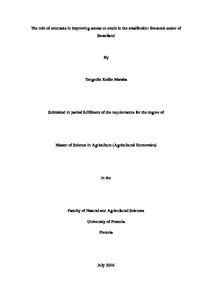Resource information
The study investigates the role of contract farming in improving access to credit for smallholder cattle producers, cattle finishers and traders in Swaziland. The contracts are verbal or informal and involve smallholder cattle producers, cattle finishers and traders on the one hand and other stakeholders in the value chain on the other. The study determined (a) the credit access status of smallholder cattle producers, finishers and traders, and whether participating in contracts leads to improved access to credit; and (b) identified factors that determine smallholder farmers’, finishers’ and traders’ access to credit from formal financial institutions and those that may lead farmers to become involved in contracts with other actors in the value chain. Two sets of structured questionnaires were designed to capture the required data for farmers, finishers and traders. The sample size was 111: 53 cattle producers, 36 cattle finishers and 22 cattle traders. Two logistic regression models were applied. One model was employed to identify factors that determine access to credit from formal financial institutions. The other model was employed to identify factors that may lead farmers to become involved in contracts with other actors in the value chain. The descriptive results indicate that 36 %of cattle producers, 36 % of cattle finishers, and 50 % of cattle traders have access to credit from financial institutions. Informal channels, such as friends and relatives, are the predominant lenders. The results from the logit model for participation in formal contracts indicate that off-farm income, better access to extension services, being a member of a farmers’ association, having access to assured market and access to marketing information are positively associated with farmers’ involvement in contract agreements. The logit model on formal credit access indicates that income received from other business activities, age of the farmer, herd size, and training in beef cattle production had significant effects on a farmer’s probability of having access to formal credit. The results further reveal that participating in contracts does not determine access to credit from formal financial institutions. The study makes recommendations for increasing farmers’ involvement in formal contract agreements, particularly by enhancing access to market, improvements in capacity building and, encouragement of collective action of farmers. In addition, their involvement might be improved by increasing farmers’ access to credit from formal institutions by encouraging beef cattle farmers to diversify, thus receiving income from other businesses, and also the provision of producer training (and trader training) on marketing and production activities. It is further concluded that participating in contracts does not lead to improved access to credit and also access to credit relatively decreases participating in contracts. There is need to target the implementation and the monitoring of credit interventions for smallholder cattle farmers in order to improve their access to credit and participation in contract farming.



